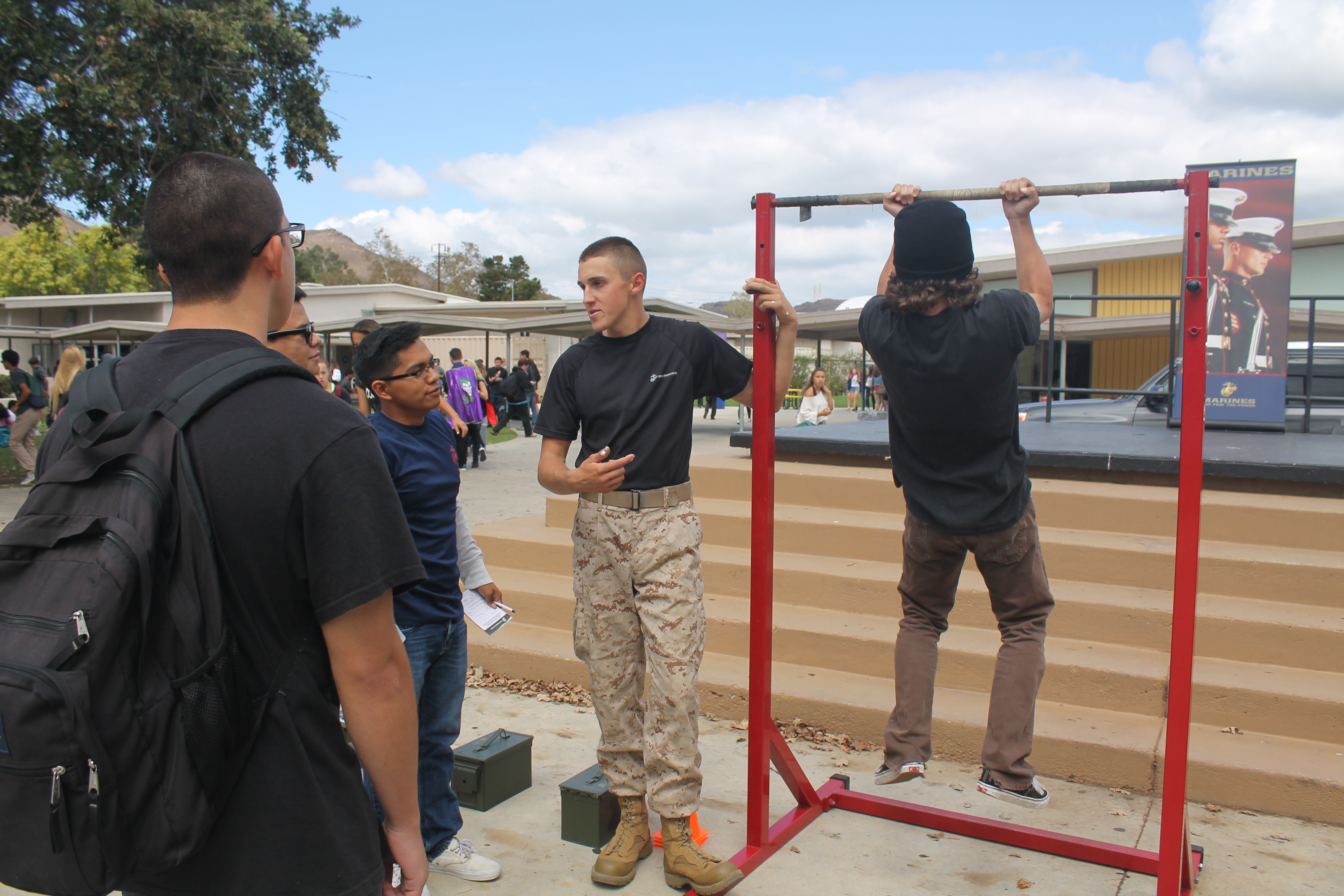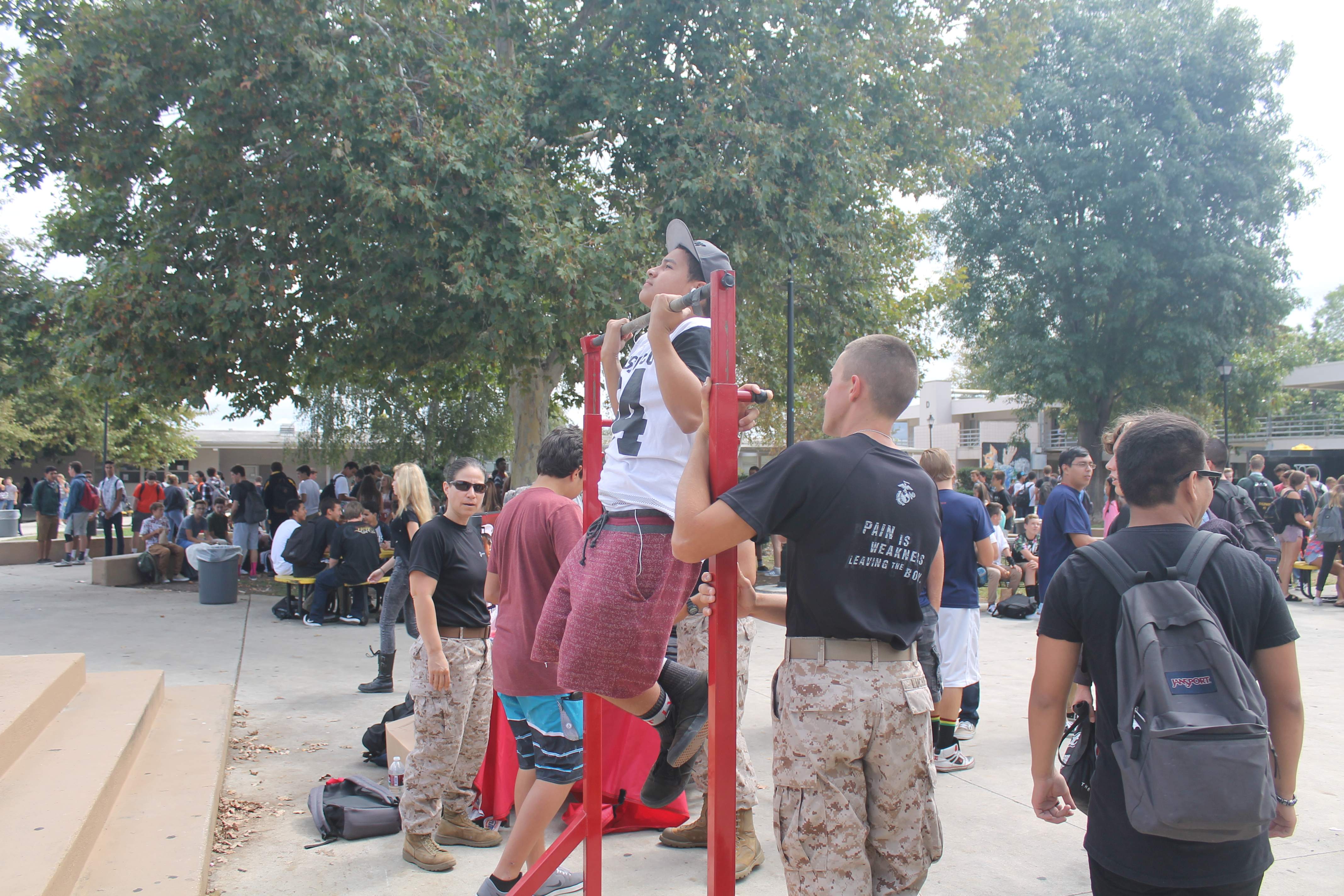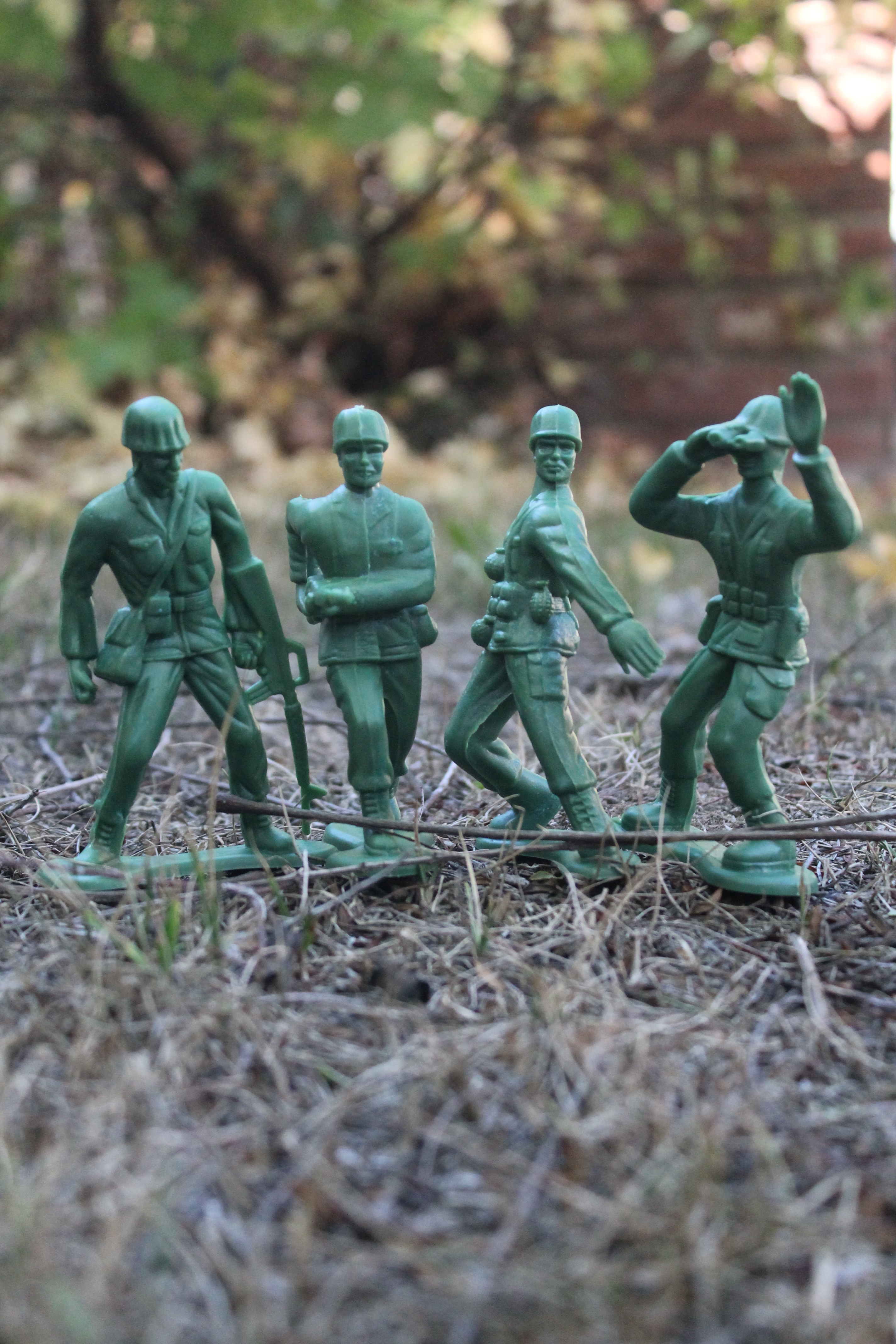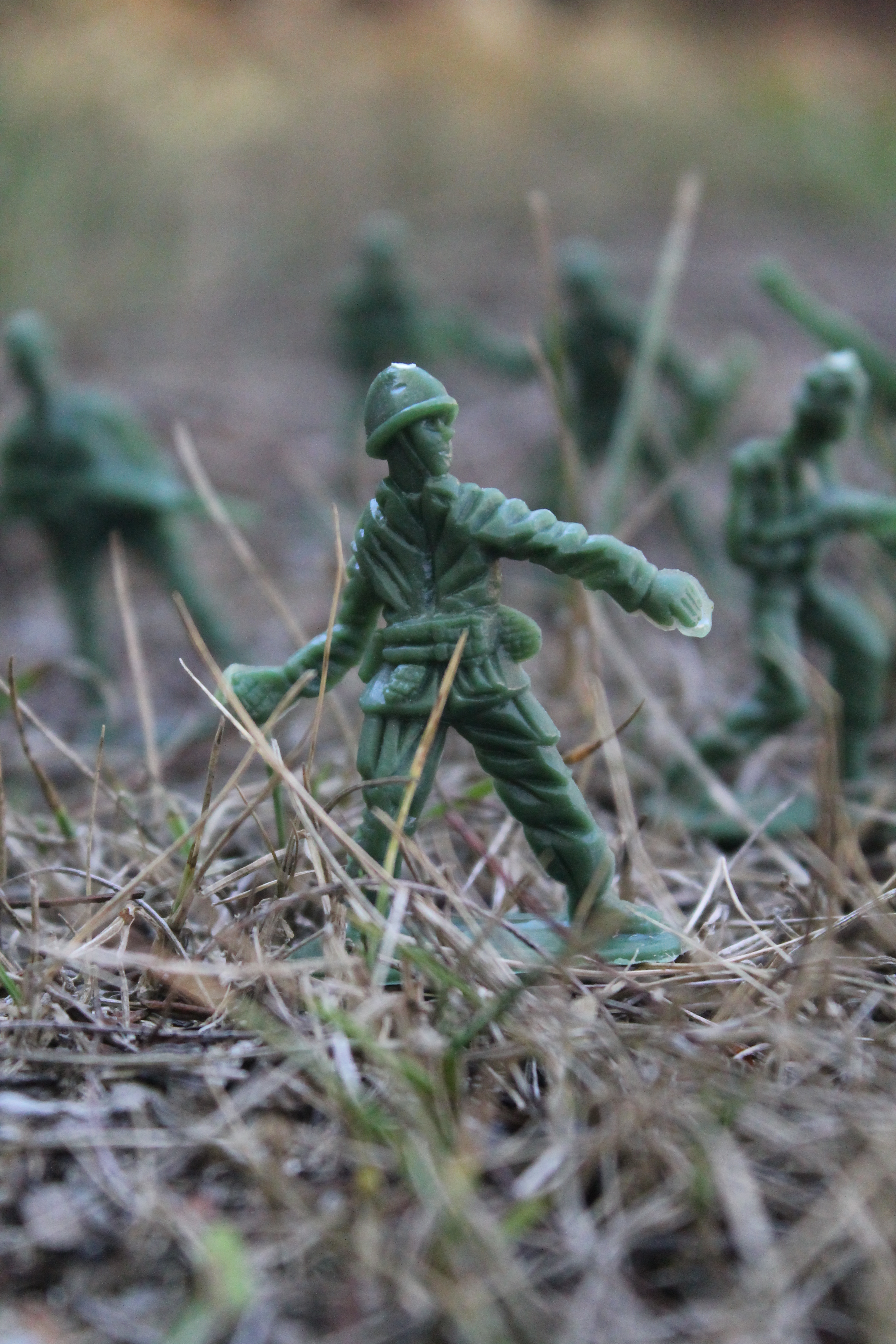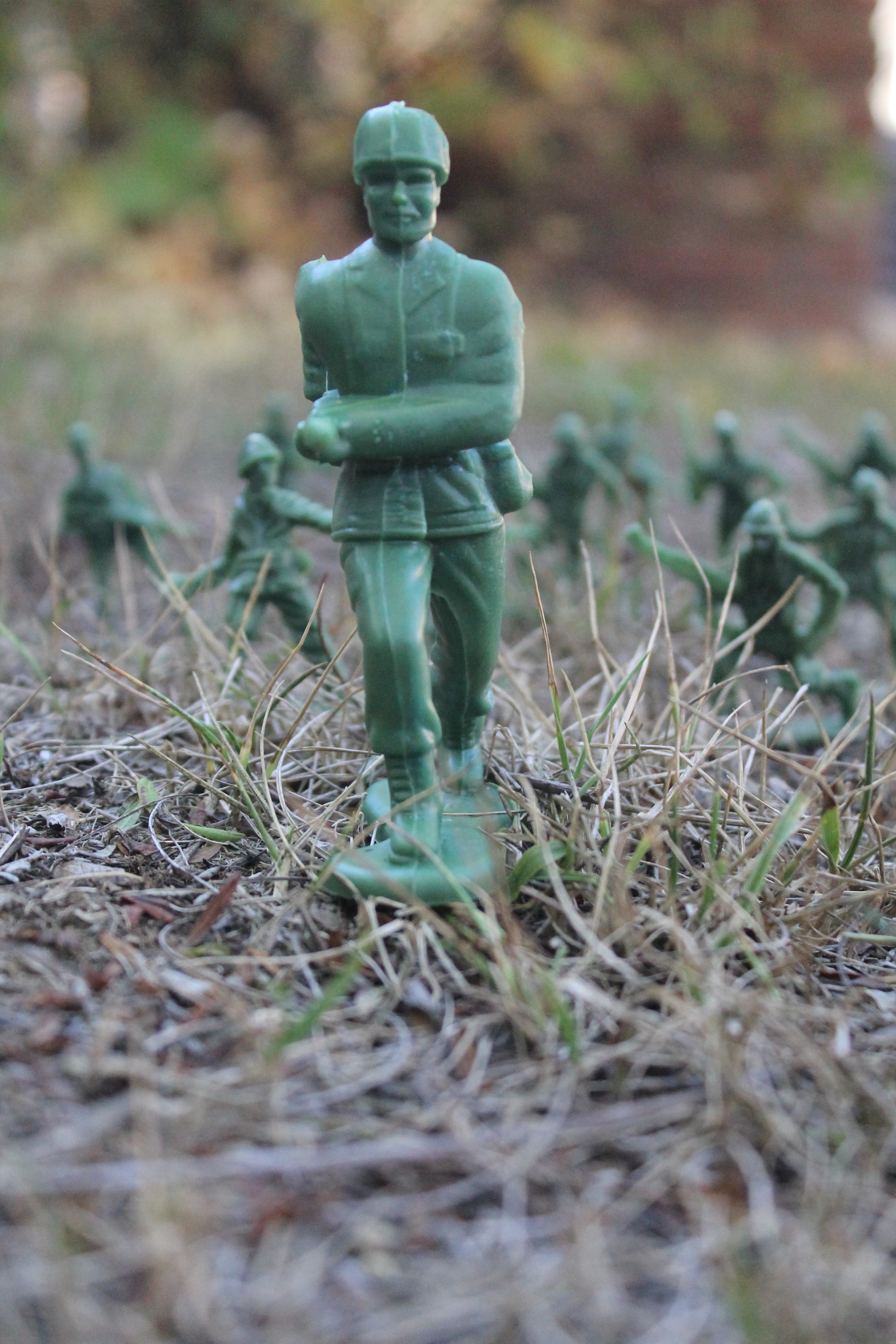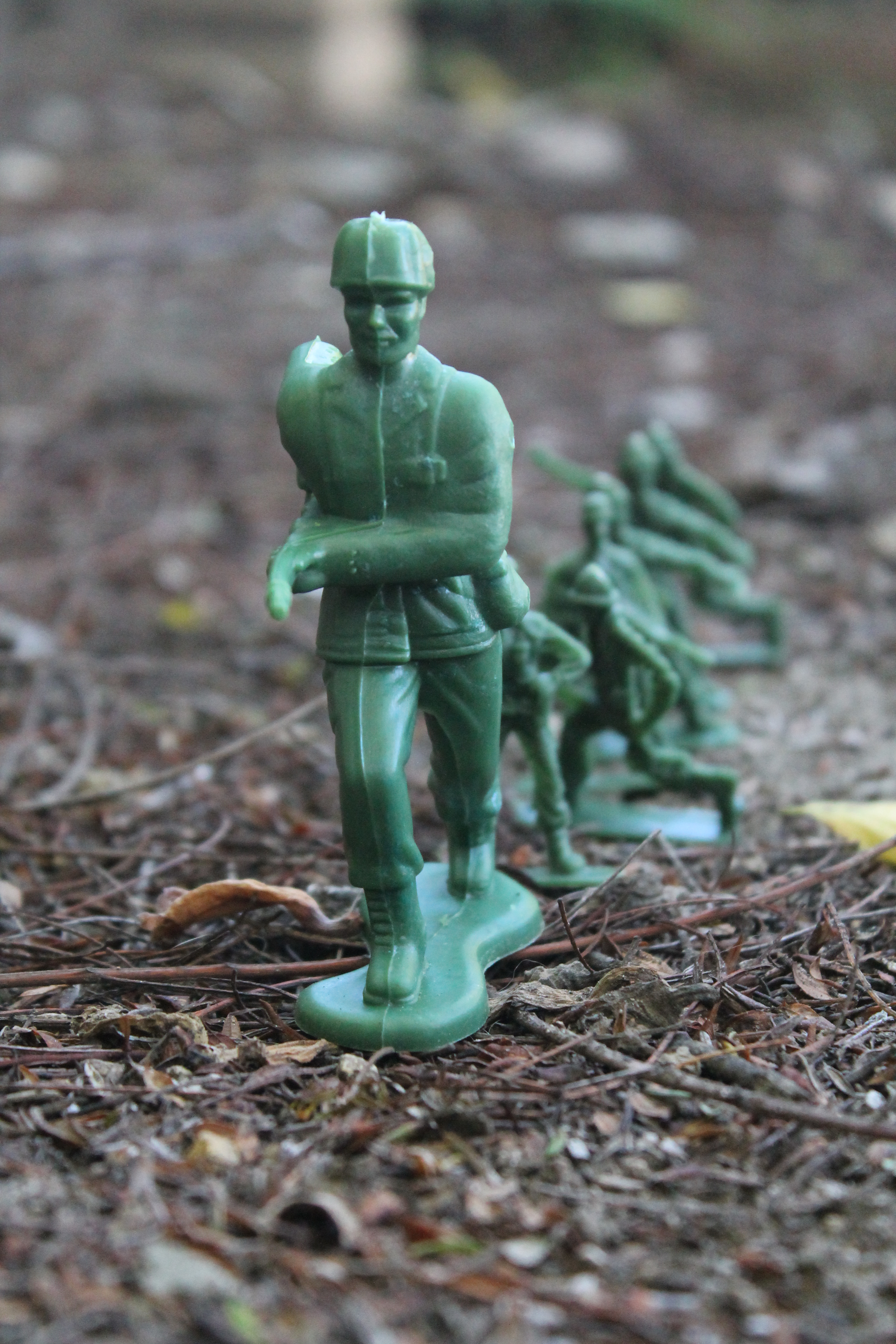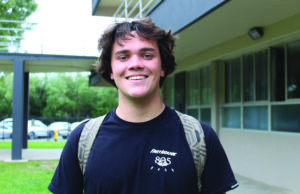Recruit to Salute
Students make a military commitment
High school students who join the military straight out of high school may see combat before they are old enough to rent a car or buy alcohol. The military is a career path that teaches a variety of skills while being paid to do it, yet there are many risks involved.
In order to explore potential career paths in the military, students can talk to recruiters found on and off campus to learn about the opportunities and risks that come with enlisting in the military.
“I really liked the atmosphere. It was like a really big family,” said Collins Frovarp, a senior who decided to join the Marine Corps after visiting a recruiting substation. Frovarp hopes to become a military policeman and dog handler. He began the process of joining the Marines about a year ago when he started talking to Sergeant Varela, a Marine recruiter who can be found on campus.
“[She told me that] nothing is ever a given. You have to earn it. Everything is earned. I really like that,” Frovarp said.
“I have always been interested in the Marines my entire life because my family has a background of ex-military,” said Brock Barton, another senior joining the Marines. Barton is looking to serve as a recon marine which would make him part of a special operations force. Like Frovarp, he has been speaking with Sergeant Varela. He and Frovarp both leave in July for bootcamp.
These students’ decisions to join the military have invoked a range of emotions from their families.
“My dad, obviously since he is ex-military, loved it, the idea of me joining. My mom was the one more cautious about it and not really wanting me to go. She is finally accepting the fact that I’m heading out,” Barton said.
“My parents are alright with it. The only thing they said was that I can’t go [infantry] which was my original plan,” Frovarp said.
Army Staff Sergeant Samuel Castaneda, who works on campus every Thursday, explained that the Army is recruiting many high school graduates. However, these to-be servicemen and women do not always join the military looking for the same opportunities.
“Some say they want to serve their country. Some say they want to go travel. Some of them say, a lot of them actually, say they want to go to college full time and at the same time travel the world,” Staff Sgt. Castaneda explained.
These benefits are a major factor for many people joining the military. Frovarp mentioned that after serving 20 years, servicemembers get a pension that helps them in civilian life. Staff Sergeant Castaneda is currently having his college education paid for by the Army.
But the benefits are not only tangible. “Once you are a Marine, you are always a Marine,” Frovarp said. Barton feels as if the respect most people have for those who serve in the military will help him find a career later in life. “Firefighters, they love military. Cops, they love military. You have a lot of benefits when you come back [to civilian life].”
Despite the benefits, there are also many dangers involved with joining the military. There is the risk of not only physical injury or death, but also mental injury.
“I tell them right off the bat, the Army, it’s a big organization. There are some risks involved in this profession,” said Staff Sgt. Castaneda. “There is the possibility that you could be deployed to a combat zone at any given time in the future… and they [the people joining the Army] understand that, too.” Both Barton and Frovarp said that recruiters have explained the risks of military service to them, and that they are prepared to take them.
Once they graduate, both Barton and Frovarp will be joining the military before they turn 18, and neither of them see this as a problem.
“No one is forcing us to do it. It’s just something that you want to do, and I think that it doesn’t matter what age you are. I think that if you want to serve your country, and fight for your country, that you should be able to do that,” Frovarp said.
ROTC Training
Sitting on his green shortboard in the ocean off Silverstrand Beach, Adam Oehmke, 25, hoped to clear his mind and determine his future before the next wave came in. He had finished his second year at Ventura Community College and needed to decide what was next. By the time Oehmke left the beach, he did not bother to change because he wanted to make it to the ROTC office before it closed.
Before Oehmke made the decision to walk into the ROTC office, he considered other routes to the military, but chose to go to community college first. “I originally thought about going to the academy [out of high school], but then decided that it wouldn’t be the best fit for me. After two years at Ventura College I decided that I really wanted to be a fighter pilot, and that ROTC would be the best way for me to accomplish that goal,” Oehmke said.
Reserve Officer’s Training Corps (ROTC) is a program put in place for all branches of the U.S. Armed Forces. Those accepted into the program have their college tuition paid for, and undergo military training while taking normal college classes. Upon completion, they are commissioned into the military with the rank of Second Lieutenant.
However, getting accepted into the program is no small feat. Cordel Frovarp, 20, a current member of the ROTC program at the University of San Diego, recalled applying to get into the ROTC program. “The interview is stressful. I was interviewed by Chief Warrant Officer Hill. It’s stressful because you’re passionate and it’s what you want to do, so you’re worried that they might decide you’re not good enough. The difference between a good and bad interview can make or break your chances. For some people the route to ROTC ends right there,” Frovarp said.
Oehmke can remember the first time he walked into the ROTC office. “I was pretty nervous. I was a total surf bum when I walked into the ROTC detachment for the first time . . . I was wearing board shorts, a tank top, and flip flops, with long hair and salt water dripping out of my nose because I had just finished surfing. But I knew that it was what I wanted to do, so I buckled down, and got a haircut.” Oehmke said.
Thousands of people apply for the program from all over the country, and only 2,500 spots can be filled per year. And it doesn’t get any easier from there. For many, this workload and rapid change from civilian life to military life is too much to handle. “The hardest part was adjusting and learning your place. Dealing with the busy schedule and day to day was hard at first.” Frovarp said.
Sam Whipple, a current Naval ROTC (NROTC) cadet at the University of Southern California, agrees. “The toughest part so far has been balancing NROTC physical, mental, and moral development with school academics.” Whipple said.
On the other hand, Oehmke had a much easier transition into ROTC. “(I) was able to adapt to the new lifestyle pretty quickly. I think it was easy to adapt because I wanted to be a pilot more than anything. When you have a goal like that you will do anything to achieve it. I still found time for surfing though,” Oehmke said with a smile.
The cadets are put through vigorous training every day, both physically and mentally. “An average day would consist of meeting in the morning for classes on leadership where we would do presentations, and have discussions,” Oehmke said. “Then we would go to our leadership laboratory or ‘Lead Lab’ which was a forum for cadets to get first hand experience by leading each other. We would then do physical training, and then go to our normal college classes.”
But at the end of four years, those who remain are commissioned officers in the U.S. Armed Forces. Oehmke is now a First Lieutenant and flies F-22 fighter jets. “(The training) was great in preparing me to perform my job. Flying requires a lot of hard work, preparation, study, and professionalism, which I feel are all tools that I gained through ROTC,” Oehmke said.
Getting into uniform
Many paths are available to pursue after high school, including being recruited into the military and serving the country. Compared to taking the college route, joining the armed forces has “many more educational, medical, career opportunities and travel benefits,” according to Sergeant Samuel Castaneda, US Army Recruiter.
“People should join because they have a desire to serve a cause greater than their own.There are many benefits to joining that attract a lot of people. People that value life/work experiences along with education should join the Army,” said Staff Sergeant Brandon Walls, US Army Recruiter.
If a student is interested in serving, they should first research the branches of the military and their functions to see which one matches the student’s interests. If the student still has questions, they should contact a recruiter; they visit the College and Career Center on a weekly basis. In addition, each branch of the military has a multitude of job opportunities that aren’t necessarily fighting related.
“The Army has career fields in: Legal/ Law enforcement, Medical, Combat Arms, Linguistics, Special Operations, Transportation, Engineering, Maintenance, Administration and Aviation. Within the Army there are many programs soldiers can qualify for that are not part of the initial enlistment process such as, Psychological Operations, and Civil Affairs. Other soldiers volunteer for duties like Drill Sergeant, Range Cadre (instructor), ROTC Instructor, and Recruiter,” said Staff Sergeant Brandon Walls, US Army Recruiter said.
“The United States Navy has over 75 career fields and we are the only branch to offer Nuclear Engineering as a path. We have special warfare such as Navy SEALs, Aircraft Mechanics, Culinary Specialists, Medics, and Construction workers to name a few. You can really do anything in the Navy,” Sergeant Preston Clary, US Navy Recruiter added.
In order to be eligible to apply for an armed forces career, a student must be at least 17 and have parental permission, be at least a junior or senior in high school, have no major medical problems or criminal records, must be a US citizen or permanent resident, have no visible tattoos, and pass the ASVAB (Armed Services Vocational Aptitude Battery) based on English and math skills.
“The military is not for everyone. This great nation of ours has become what it is through the selfless sacrifice of its citizens and we only take the best,” Clary said.
When a student has decided to apply to enlist in the military, they should contact Carmacita Ricafort in the College and Career Center and ask to set up an application appointment with a recruiter. The recruiter will first call for a phone interview to ask preliminary questions and then meet in person for a second interview where the applicant must answer questions and take the ASVAB. If the student passes the test, they then must have a physical exam. If they pass that too, the student may choose which career they would like to enter.
“All kinds of people join, most of the people who join around here need structure, discipline, adventure, steady career, or just need it to pay for college. A lot of applicants are aspiring Firefighters, Police Officers, or would like to enter the Medical field,” said Clary.
If you are interested in the armed forces, pursue it.The military provides an individual an unique experience with many leadership opportunities along with a newly developed sense of patriotism.
“Only 1% of American Citizens serve in the US Military today. If you want to make a difference in your life and in our Country, the US Army is a great way to kick off your career and your future as a Soldier and as a Citizen of this great Country,” Walls said.
Newbury Park meets world
For generations, military families have experienced the pride and pain of waving goodbye to their loved ones as a member of their family departs to serve outside U.S. borders. However, the families themselves are sometimes forced to face numerous relocations, sending them as far across the globe as Naples, Italy and Okinawa, Japan.
Newbury Park High School is exactly 13.4 miles from the Naval Base Ventura County, located in between Point Mugu and Port Hueneme. This makes NP a convenient location for military families to reside and attend school.
There is no limit on the number of times military personnel can de deployed and each time they must leave behind their lives and their families.
Leo Creger, a Commander for the Navy and father of Luke Creger, junior, has been deployed twice, each time for one year.
“It was lonely,” Luke Creger said. “The idea of not seeing him everyday, [him] not being at my baseball games.”
Luckily, because of the advanced technology available, Luke and his family were able to see his dad using video chat.
“We were able to skype about once a week during the year he was gone while I was in second grade. He sent me a new Lego set every month,” Luke said.
There are also instances in which the younger generation feels inspired by their relatives in the military and decide to enlist. Steven Vajcovec’s, junior, father is a Combat Medic in the United States Marines and has influenced Vajcovec to follow in his footsteps.
“He impacted me in a very special way and is the reason why I want to join the Marines,” Vajcovec. “I want to become an Infantry Officer. Infantry Officers are the first ones on the field to fight in combat. As an officer, I would lead my platoon.”
Vajcovec says he feels great pride in his father’s service and admires his bravery. “I wasn’t really devastated [about my father leaving]; I was very proud of Dad for fighting for our country and keeping everyone safe. We were all proud [and] I knew he was coming home,” Vajcovec said.
Deployment is not the only possible adjustment in the lives of military families; there is also the chance of relocation.
Raevyn Walker, senior and former NPHS student, had to move to San Diego, California this past year because of her father’s job as a Chief Warrant Officer in the Navy. Thus far, he has had to relocate seven times.
“We have lived in Chesapeake, Va; Washington, DC; Singapore; San Diego, Calif; and Camarillo, Calif. Some places we have lived in more than once,” Walker said.
After moving several times, Walker has learned to become accustomed to relocating and has even begun to enjoy it. She believes it has made her family stronger as a unit.
“Really, it just takes time. I have hated every place that I have moved to and I have loved every place that I have left,” Walker said.

